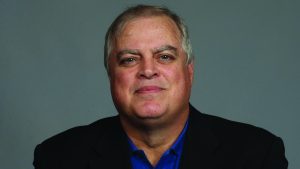Media: June 2018
WSCR (The Score) Morning host Mike Mulligan has the background that Chicago sports fans seem to require. He is one of us. “I grew up on the South Side, and went to school at Quigley, and college at Loyola.” He also grew up listening to the radio, and he understands our unique market history. “I used to listen to late night radio like Eddie Schwartz and Dave Baum when I was a kid. I had a buddy who knew someone who worked at the Loop, so we helped out at Loopfest one year. We worked the Lorelei both. Radio seemed like a lot of fun.”
Four decades later Mulligan is one of Chicago radio’s elite, co-host of one of the most popular radio programs on the dial, Mully & Hanley on 670 AM. His journey from Lorelei booth-worker to morning host wasn’t exactly a straight line.
“I got a job with the Sun-Times as a freshman in college. I was working as a stringer for Taylor Bell covering high school games. When I graduated, I was hired as an editorial assistant, which was a terrible job. I was compiling box scores and the stats in the back of the paper. I took the job in order to be hired [by the paper], and then I worked my way up as a writer. “
Mulligan eventually became one of the top columnists in Chicago sports, and as such became a frequent radio and television guest.
“I never felt self-conscious about being on the air. I never felt like ‘oh my god; there are people listening,’ it was just natural conversation. I was on The Sportswriters on TV the final nine months. The premise of that show was there were a bunch of guys sitting around talking sports, and you were just watching them from the next table. I always loved that premise, and that’s what I’ve always done on the radio too. Even when we call up experts or athletes, these are people we talk to all day long as sportswriters, and it’s perfectly normal to do it on the radio.”
After a stint at One on One Sports and Sporting News Radio, Mulligan found a home at the Score. He was eventually partnered with fellow Sun-Times sportswriter Brian Hanley. Even though the ratings didn’t instantly click, the relationship between the two sportswriters did.
“Brian and I have an easy chemistry together, a similar background. We have a lot of things in common. He’s a Cubs fan from River Forest and worked at the Sun-Times as a sportswriter, and I’m a South Side Irish Sox fan that was a sportswriter at the Sun-Times. Although, you know, it’s funny, we weren’t really close friends when we worked at the Sun-Times together. When you’re a sportswriter on a beat, your friends are the guys from the opposition. Those are the guys you travel with, who you see all the time. But when we got to know each other better, we found out that we were the same. We even dressed the same.”
At first, they did middays together, but when the morning show opened up, the two jumped at the opportunity. “I remember when we were vying for the morning show, they told us that we’d never win because (ESPN AM 1000 morning competitors) Mike & Mike had a national profile. They were doing Letterman, and national commercials, and things like that. And I would listen to that show on my way in when we did 10 am-noon, and I thought – the people I grew up with didn’t care about the Jets, or Boston, or whatever. We just played the sports of the season, and we moved on to the next season, and we didn’t care about any of the teams except Chicago’s teams. I really thought it was an advantage that we were the “local” show and not a disadvantage, and it turned out to be true.”
The one disadvantage of doing mornings as opposed to middays was the lifestyle change. Many of the sporting events took place at night. That’s pretty incompatible with an alarm clock going off when it’s still dark outside.
“It’s a real problem. That’s a dilemma. You live for the afternoon games, and you gotta pick your spots. Football is great because it’s once a week, but for the big events, you just have to power through. It’s not that first day that’s the problem. It’s two days later or three days later when you’re just wrecked. I always tell people that mine is a fragile eco-system. You have to get to bed on Sunday and get a good night’s sleep. As long as you are sensible on Sunday night, then Wednesday goes better.”
After nearly a decade in the job, Mully and Hanley run a well-oiled machine. Mully gives a lot of credit for the show’s success to the arrival of a key behind-the-scenes contributor. “Dustin Rhodes is our producer, and we got a lot better when Dustin got involved. He just knows things about radio – things that we didn’t know. I think it’s real simple – you gotta play the hits. Dustin has really preached that. He really knows what a good story is.”
Another arrival in recent days is a new station owner, Entercom. They’ve already made a few changes in the station lineup, and there are rumblings of future moves, but the morning show hasn’t changed at all. When I asked Mulligan if he had noticed any difference in the culture since the arrival of the new bosses, he said no. He added an important disclaimer, however. “When you work on a morning show, you kind of live in a bubble. We are leaving every day when everyone else is arriving.”
If the bosses know what they are doing, Mully and Hanley won’t be leaving the morning slot for years to come.
-Rick Kaempfer













“If the bosses know what they are doing…”
Prescient.